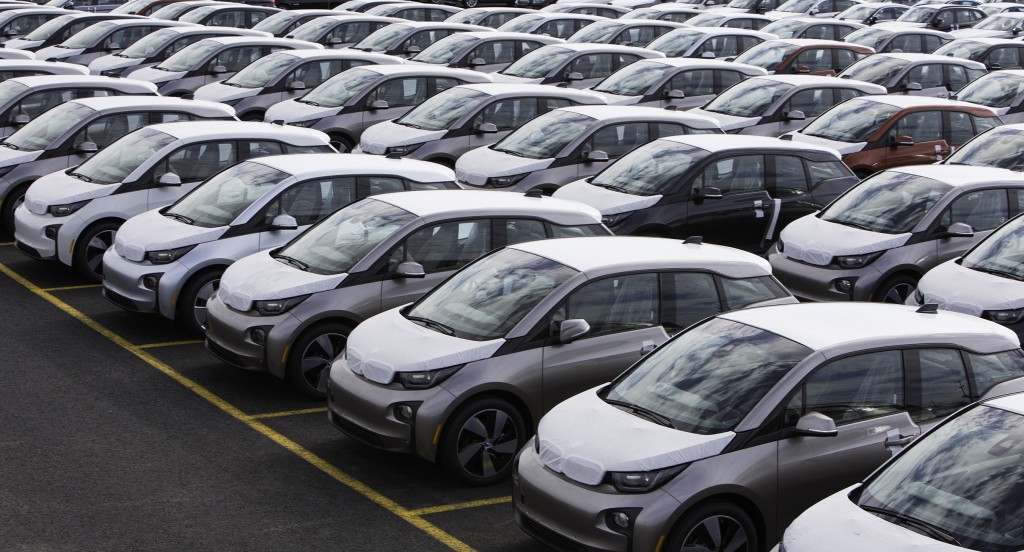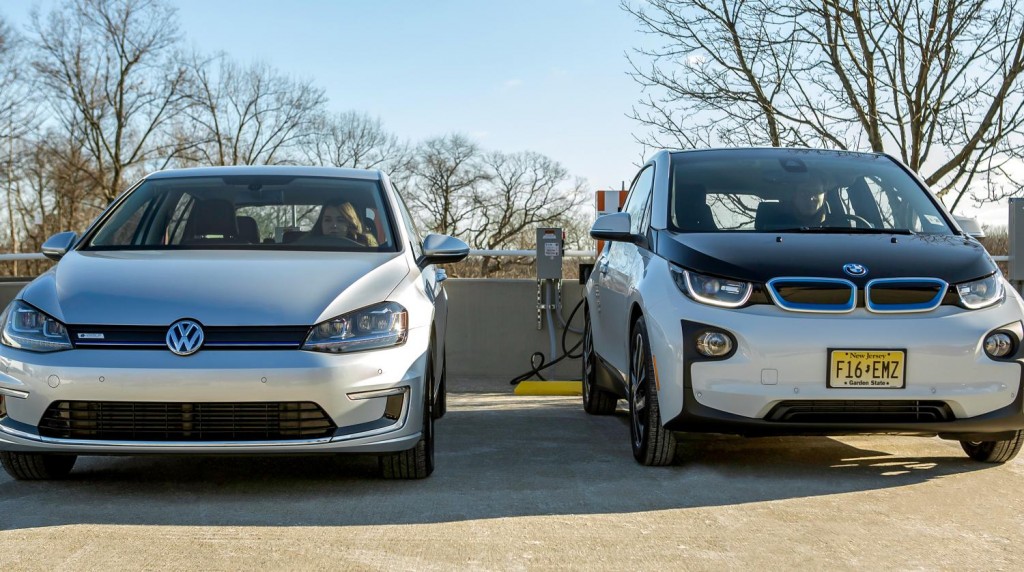One of the notable features of last year's electric-car sales was the strong, and so far sustained, sales of the radical new BMW i3 electric car.
The little plastic-bodied battery-electric vehicle from Munich, with its odd coach doors and its rear electric motor, sold more than 1,000 cars a month in four of the eight months last year it was on sale.
DON'T MISS: BMW i Electric Car Sales Surge For 2014; More To Come, Company Says
The total of 6,024 i3s delivered put BMW's first electric car in sixth place among the 21 plug-in vehicles on sale in the U.S.
Among battery-electrics, it won third place, after only the Nissan Leaf and Tesla Model S--despite being sold for only two-thirds of 2014.
But despite a rumored target of 5,000 deliveries in its homeland of Germany, only 2,128 i3s found homes there during all of calendar 2014.

2014 BMW i3 electric cars waiting at East Coast shipping port for distribution, May 2014
A report last autumn indicated that BMW planned to boost incentives on the i3 in Germany, with only 1,900 sold during the first nine months of the year.
For perspective, 16.4 million vehicles were delivered in the U.S. last year--against 3.0 million in Germany.
So the BMW i3 represented twice as high a proportion of overall sales in Germany (0.071 percent) as in the U.S. (0.037 percent).
ALSO SEE: BMW i3 Sales Slow In Germany; Will They Hold Up In States? (Nov 2014)
Still, the question remains: Is the BMW i3 underachieving in Germany--and, if so, why?
The enthusiast site BMWblog took a crack at answering that question three weeks ago
The site suggested five reasons that the i3 electric car is "yet to be a sales success in Germany":

2013 Tesla Model S and 2014 BMW i3, Hudson Valley, NY, Nov 2014
- Public transportation: Mass transit in Germany is pervasive, reliable, clean, and well-integrated, so short trips need not be done by car.
- Charging: Far more Germans live in apartments than in the U.S., meaning that home charging can be considerably more challenging.
- Pricing: No BMW is exactly inexpensive, but as a second or city car, an i3 lease (at more than $500 a month) is pricey compared to mass transit.
- Tesla: With the Model S offering more than twice the range, plus a completed Supercharger network in Germany, it is far more capable of serving single-car households.
- Overall appeal: BMWblog suggests that the environment is less important to Germans than to Californians (we might disagree).
MORE: Plug-In Electric Car Sales Continue Rise In 2014: 100,000-Plus Last Year
Overall, we'd suggest these are early days yet.
BMW still sold more i3s (more than 16,000) during 2014, far more than the 10,000 it had earlier said it expected to sell.
With all three German makers now firmly on board in offering various plug-in vehicles, we suspect i3 sales have yet to peak.

BMW i3 and Volkswagen e-Golf electric cars using Combined Charging System (CCS) DC fast charging
German buyers, who are clearly more brand-loyal and perhaps inherently more cautious, may simply find the i3 not as a good a fit for their needs as U.S. buyers in some areas.
But BMW is clearly committed to sales of the i3, and it's obviously found some audience in both countries.
And that's not even counting additional BMW i models in the coming years. Stay tuned.
_______________________________________________













